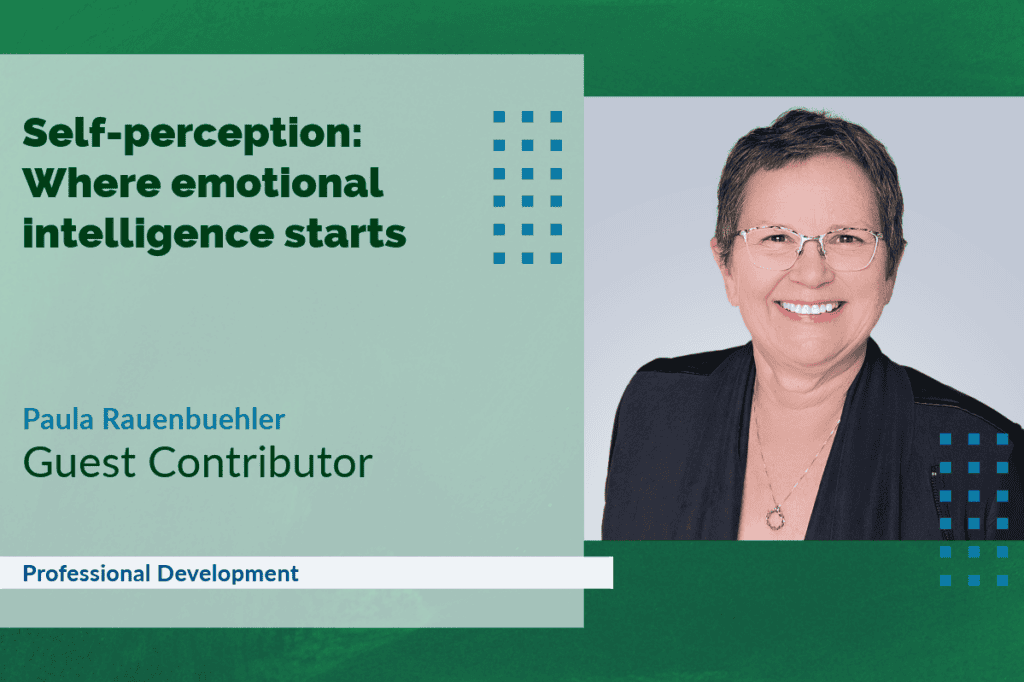
August 26, 2024
In a world that increasingly demands emotional acumen, understanding ourselves is the cornerstone of success and fulfillment
Self-perception – the lens through which we view our thoughts, feelings and behaviors – is a critical component of emotional intelligence.
The spectrum of self-perception
Though self-awareness is often lauded, it’s essential to recognize that it exists on a spectrum. Too little or too much self-awareness can hinder our personal and professional growth.
The EQi 2.0 assessment tool I use with clients provides this breakdown of self-perception:
Self-regard
This is how we value ourselves.
It’s a delicate balance between self-doubt and arrogance.
Those with low self-regard may be plagued by an inner critic, constantly berating themselves.
People with excessive self-regard can become burdened by grandiose thoughts of superiority and a constant need for validation.
To counter self-doubt, try treating it like a witness in a courtroom.
Rigorously challenge its claims, demanding evidence for its accusations.
To dial back on self-regard, recognize the role that other relationships hold in your life by adding a dose of empathy.
Self-actualization
This is about our drive and motivation.
We can be underachievers or overly ambitious.
Both extremes can lead to dissatisfaction and burnout.
A healthy balance involves setting realistic goals and finding intrinsic motivation.
In today’s workplace, where disengagement is alarmingly high – with nearly 80% of workers reporting feeling disconnected – the link to self-actualization is clear. When individuals aren’t fulfilling their potential, they’re less likely to be engaged and motivated.
Underachievers may become bored and uninspired, while the overly ambitious can be consumed by a relentless pursuit of goals, never feeling satisfied.
If you find yourself on the higher end of that hamster wheel of always going for the next goal, consider how a reality test might be integrated to keep things in perspective.
Emotional self-awareness
This is our ability to understand our own emotions.
Being emotionally unaware can lead to misunderstandings and impulsive reactions.
We may be surprised by others’ reactions to our behavior, leaving us confused and frustrated.
On the other hand, excessive focus on our emotions can hinder our ability to connect with others.
We may become self-indulgent, overly sensitive to our own feelings or even hypersensitive to perceived slights.
This can make it difficult to build strong relationships and navigate conflict effectively.
If you are on the lower extreme, taking some time to reflect on what you are feeling can help identify what’s going on beneath the surface.
If you are over-indexing on your own emotions, empathy can be an important element to consider others’ emotions along with your own.
Striking the right balance
The key to optimal self-perception lies in finding a healthy equilibrium within each of these areas.
It’s about recognizing our strengths and weaknesses, setting realistic expectations and cultivating emotional resilience.
Here are some tips to help you achieve a healthy balance in self-perception:
- Challenge negative self-talk: Our inner critic can be a relentless foe. Replace self-criticism with self-compassion. Talk to yourself as you would a friend who is struggling.
- Set achievable goals: Don’t try to do it all at once. Break down large goals into smaller, manageable steps. Celebrate your progress along the way, and don’t be afraid to adjust your goals as needed. If you are a leader, involve others in the goal setting to reduce the “my way or the highway” situation. Take time to celebrate the small wins along the way.
- Practice mindfulness: Mindfulness involves paying attention to the present moment without judgment. This can help you become more aware of your thoughts and emotions, allowing you to respond rather than react. Ask yourself, “what’s really going on?”
- Seek feedback: Ask trusted friends, colleagues or mentors for their honest feedback. This can provide valuable insights into your strengths and weaknesses, helping you to see yourself more clearly. It can be helpful to let them know what you want feedback on so they can direct their comments accordingly. Be aware and curious about the emotions that are natural and normal when someone is giving you feedback.
- Develop self-care practices: Prioritize your physical and mental well-being. Get enough sleep, eat a healthy diet and exercise regularly. Make time for activities that you enjoy and that help you to relax and de-stress. Knowing when you are over-stressed and that you, and others, would benefit from a break can be a game changer when it comes to problem solving.
By investing time and effort in understanding ourselves, we can unlock our full potential, build stronger relationships and navigate life’s challenges with greater resilience.
Remember, self-perception, like the other elements of EQ, is by design on a spectrum. Sometimes you do need to put your air mask on first.
There will be times when you will experience ebbs and flows along the way, but with consistent effort, you can develop a healthy and realistic view of yourself and recognize when your alignment is, well, out of alignment.
The ripple effect of self-perception
Our self-perception doesn’t just affect us individually – it ripples out to influence our relationships, careers and communities.
When we have a positive and realistic view of ourselves, we are more likely to approach challenges with confidence and resilience.
We are also better equipped to build strong, supportive relationships.
Conversely, a weak self-perception can lead to self-doubt, fear of failure and difficulty connecting with others.
It’s important to remember that self-perception is fluid and can change over time.
Life experiences, personal growth and self-reflection can all contribute to shifts in how we see ourselves.
Embracing this dynamic nature of self-perception allows us to continuously learn and evolve.
Empowering yourself through self-knowledge
Understanding yourself is a lifelong journey, but it’s one well worth taking.
By developing a healthy and realistic self-perception, you can empower yourself to live a more fulfilling and successful life.
Remember, self-awareness is the foundation upon which emotional intelligence is built. By investing time and effort in understanding ourselves, we can create a ripple effect of positive change in our own lives and the lives of those around us.
Cultivating self-compassion
A crucial aspect of healthy self-perception is self-compassion.
It involves treating yourself with kindness and understanding, just as you would a friend.
By practicing self-compassion, you can right-size self-criticism and build resilience.
It’s important to recognize that everyone makes mistakes and experiences setbacks.
Instead of dwelling on failures, focus on learning from them and moving forward.
By incorporating self-compassion into your self-perception journey, you can create a more supportive and nurturing inner environment, fostering personal growth and well-being.
 Suick Lure Company continues to land the lunkers
Suick Lure Company continues to land the lunkers The jig is up on Lake Wissota
The jig is up on Lake Wissota








